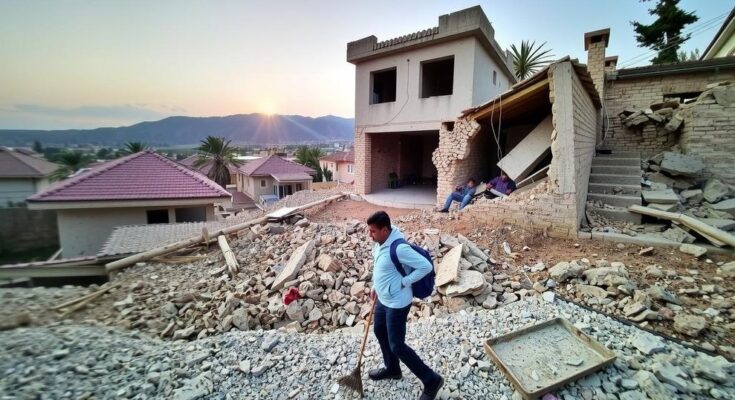The collapse of Assad’s regime has invigorated the Sunni community in Lebanon, leading to protests for the release of Islamist prisoners. Sunni Islamists, catalyzed by the victory of Tahrir al-Sham in Syria, aim to reassert dominance over Hizbullah. Tensions regarding the upcoming presidential election reveal potential shifts in political power, influenced by external factors from Syria’s new leadership, suggesting ongoing instability in Lebanon’s political landscape.
The aftermath of the Assad regime’s collapse in Syria ignited waves of celebration across Lebanon, particularly in Sunni-dominated areas such as Tripoli, Sidon, and Beirut. However, this euphoria swiftly transformed into demands led by Sunni Islamists for the release of Islamist prisoners held in Lebanese jails. Sheikh Ahmad Shemali spearheaded a protest on December 10, advocating for amnesty for these individuals, underscoring a revitalized Sunni political movement influenced by the jihadi Takeover in Syria, notably by Tahrir al-Sham (HTS).
This burgeoning Sunni unity is aimed at reasserting dominance over the Shiite political landscape, currently led by Hizbullah, which is grappling with diminished support following defeats against Israel and the Alawite/Shiite losses in Syria. Given the political climate, where amnesty remains at the discretion of the Shiite speaker of parliament, Nabih Berri, the prospect of such a release for hundreds of Islamists appears unlikely, as it would potentially realign power dynamics in favor of the Sunni community and reinstate Syrian influence over Lebanese politics.
Meanwhile, the broader Lebanese political environment is tumultuous as the Shiite faction strives to maintain its influence amid Hizbullah’s military setbacks. A notable meeting between General Joseph Aoun, head of the Lebanese Armed Forces, and Hizbullah’s Wafiq Safa revealed underlying tensions regarding the implementation of a ceasefire agreement in southern Lebanon, which could further compromise Hizbullah’s standing as a military entity. Additionally, discussions around the upcoming presidential election reveal instability within the Christian community as factions vie for a candidate who can unify their efforts against Hizbullah.
The Sunni community’s awakening occurs against the backdrop of a Sunni-led regime in Syria, which presents both opportunities and challenges. Lebanese political leaders express concerns about the potential spillover effects of unrest in Sunni regions and the resurgence of jihadism, linking back to historical conflicts such as the ISIS conquest of Arsal in 2013. Ahmad al Sharaa, a prominent figure in the Syrian opposition, indicated support for Aoun while reassuring a non-intrusive approach toward Lebanese affairs, suggesting that while tensions remain, the new Syrian regime will not immediately instigate destabilization.
Overall, the developments in Syria continue to cast a significant influence over Lebanon’s political landscape, indicating ongoing complexity and uncertainty as factions maneuver for power in this volatile region.
The article discusses the ramifications of the Syrian civil war’s outcome, particularly focusing on the political dynamics within Lebanon. With the fall of Assad’s regime in Syria, the Sunni community in Lebanon has experienced a resurgence, challenging the established Shiite political order led by Hizbullah. Amid calls for the release of Sunni prisoners, the Sunni Islamists have gained momentum, potentially reshaping Lebanon’s political landscape. As Hizbullah confronts its diminished stature, the article emphasizes the delicate balance of power and the external influences exerted by the evolving Syrian political environment. The potential for instability in Lebanon arises from renewed Sunni activism and the geopolitical complexities in the region, particularly under the watchful gaze of neighboring Syria’s new Sunni regime.
In summary, the collapse of Assad’s regime has resulted in significant political shifts within Lebanon, marked by a reinvigorated Sunni movement demanding justice and recognition. Amidst internal conflicts, particularly concerning Hizbullah’s waning influence and the complex relations among various factions, Lebanon stands at a crossroads. The outcomes of these political dynamics, coupled with the developments in Syria, will crucially dictate Lebanon’s stability and governance in the foreseeable future.
Original Source: www.jewishpress.com




